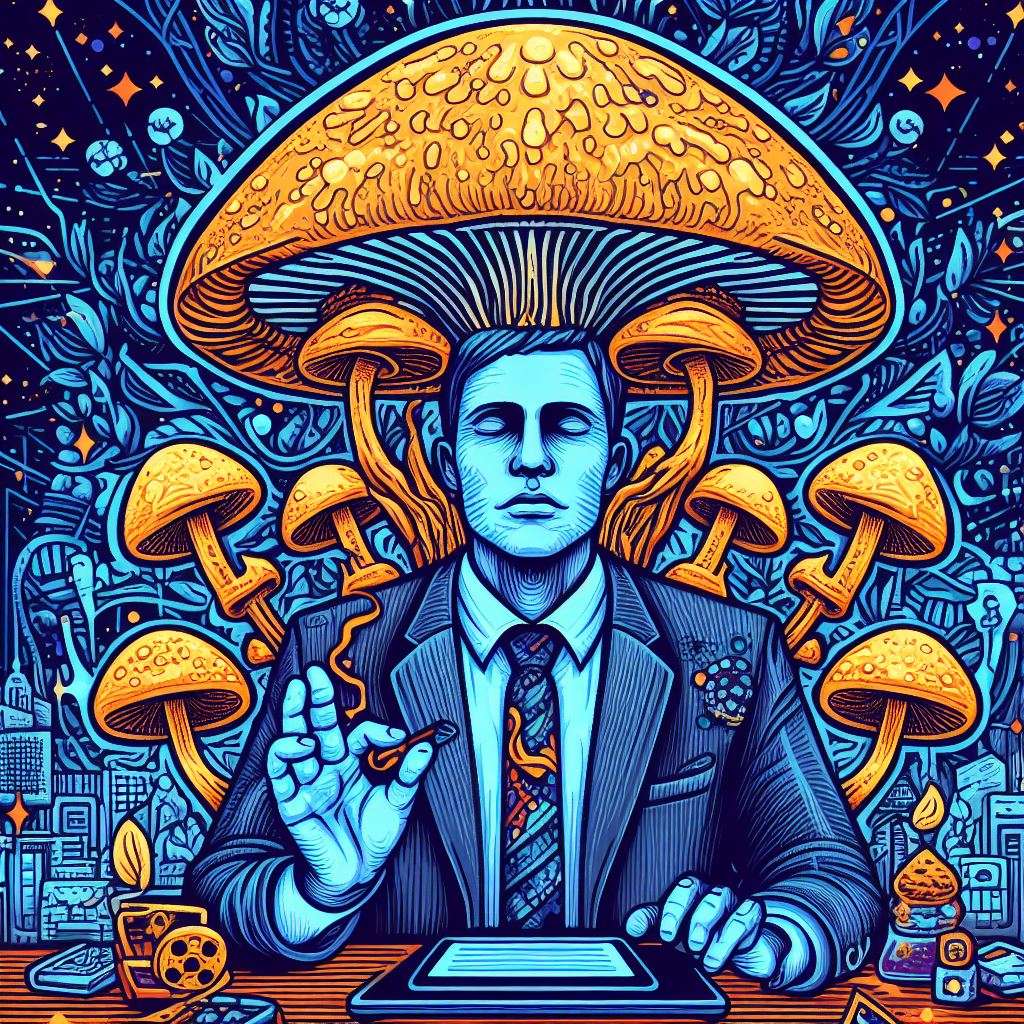In the intricate web of global drug policy, one substance has been quietly weaving its way from the fringes to the forefront of scientific and societal interest: psilocybin. Once relegated to the shadows as a recreational escape, psilocybin, the active ingredient in psychedelic mushrooms, is now the subject of intense scrutiny and, increasingly, acceptance. No longer just a curiosity of counterculture, it has become a focal point of serious scientific inquiry and legal debate.
Amidst the shifting sands of societal perceptions, psilocybin has emerged as a potential therapeutic tool, offering a glimmer of hope to those ensnared in the clutches of mental health disorders. Its journey from taboo to treatment has been nothing short of remarkable, propelled by a convergence of scientific research, public sentiment, and, in some corners of the world, legislative action. In this exploration, we navigate the complex terrain of psilocybin legalization trends in 2024, dissecting the multifaceted facets that characterize this intriguing global phenomenon.
In this article we will dissect the scientific underpinnings, the legal intricacies, and the personal narratives that collectively shape the narrative of psilocybin. Far from a mere exploration of hallucinogenic experiences, we will explore the heart of a cultural and scientific revolution, where mushroom-derived molecules are challenging conventional wisdom and reshaping the contours of mental health treatment. Join us on this expedition into the uncharted territories of psilocybin’s evolution, where the psychedelic frontier meets the pragmatic realities of modern society.
Psilocybin’s Therapeutic Potential
In the intricate dance between molecules and the mind, psilocybin has emerged as a compelling protagonist. Beyond its reputation as a recreational substance, psilocybin has found its way into the laboratories of esteemed researchers, where its potential to alleviate the burden of mental health disorders is being meticulously examined. This isn’t just about the euphoric high of a psychedelic experience; it’s about harnessing the profound effects of psilocybin in a therapeutic context.
Psilocybin in Mental Health Disorders
In the context of mental health, psilocybin isn’t just a psychedelic escape; it’s a potential lifeline for those ensnared by the darkness of depression, the complexities of alcohol use disorder, and the torment of PTSD. The tantalizing prospect of psilocybin lies in its ability to offer new pathways for treatment-resistant conditions. It’s not about mere symptom alleviation; it’s about addressing the roots of these disorders, a depth that conventional treatments often fail to reach.
- Depression and Alcohol Use Disorder: Psilocybin, once confined to the shadows, is now at the forefront of research combating the bleak grasp of depression and the cyclical patterns of alcohol use disorder. Researchers are scrutinizing its ability to break entrenched patterns, offering a glimmer of hope to those who have long battled these conditions.
- Beyond Addiction: Smoking Cessation and Obsessive-Compulsive Disorder (OCD): Psilocybin’s potential extends further, challenging the grip of addiction and the relentless nature of OCD. In the haze of its effects, individuals find new perspectives, confronting their habits and anxieties in ways that traditional therapies often struggle to achieve.
- Anorexia and Anxiety: Even in the intricate web of eating disorders like anorexia and the paralyzing clutches of anxiety, psilocybin offers a unique lens. It’s not a magic cure; it’s a catalyst for introspection, allowing individuals to confront the tangled roots of their conditions, potentially paving the way for profound healing.
Research Challenges and Breakthroughs
While the promise of psilocybin as a therapeutic agent is tantalizing, it is not without its challenges. Legal hurdles, societal misconceptions, and methodological intricacies complicate the path forward. Researchers navigate a labyrinth of regulations, meticulously constructing studies to demonstrate both safety and efficacy. Each breakthrough is a testament to persistence, challenging existing paradigms and inviting a reevaluation of our approach to mental health.
In the scientific crucible, psilocybin undergoes rigorous scrutiny, not as a mystical elixir, but as a substance with the potential to redefine our understanding of the mind. The therapeutic promise of psilocybin isn’t a whimsical notion; it’s a tangible reality, one that demands our attention, understanding, and most importantly, our willingness to explore unconventional avenues in the pursuit of mental health and well-being.
Global Legal Developments
In the labyrinthine corridors of drug policy, seismic shifts are reshaping the stance on psilocybin, challenging traditional norms and sparking fervent debates worldwide. The once rigid boundaries of legality are showing signs of flexibility, reflecting a nuanced understanding of psilocybin’s potential beyond its recreational notoriety.
New Zealand’s Pioneering Psilocybin Cultivation
In the Land of the Long White Cloud, a groundbreaking milestone has been etched in the annals of drug policy. New Zealand, known for its bold approach to societal issues, has granted a license, unprecedented in its nature, enabling the cultivation of indigenous fungi containing psilocybin. This watershed moment signifies a departure from conventional paradigms, emphasizing a pragmatic acknowledgment of the substance’s potential benefits.
Australia: Psilocybin Prescriptions in Psychiatry
Across the Tasman Sea, Australia has adopted a progressive stance, enabling authorized psychiatrists to prescribe psilocybin to individuals grappling with treatment-resistant depression. This regulatory pivot marks a departure from archaic attitudes, underlining a recognition of psilocybin’s therapeutic promise and its potential to alleviate the anguish of those trapped in the labyrinth of mental health disorders.
Massachusetts: Grassroots Movements and Ballot Initiatives
In the heart of the United States, specifically Massachusetts, a groundswell of grassroots activism has taken root. Organizers, driven by conviction and propelled by the testimonies of those transformed by psilocybin therapy, have mobilized. Their initiative, gathering over 75,000 signatures, is a resounding call for change. It underscores the power of public sentiment, challenging legislators to reassess the boundaries of legality surrounding psychedelic mushrooms.
Oregon’s Trailblazing Therapeutic Market
On the western frontier of the United States, Oregon stands as a beacon of innovation. Within its borders, a new era of psychedelic therapy is dawning. Researchers, teetering on the precipice of excitement and trepidation, are observing as the state pioneers a therapeutic market for psychedelic mushrooms. It’s not just a legal adjustment; it’s a societal reckoning, a testament to the evolving discourse surrounding mental health treatments.
In these global legal developments, the undercurrents of change are palpable. What was once deemed taboo is now being approached with a pragmatism rooted in scientific inquiry and compassion. The legal landscapes are shifting, not out of blind acceptance, but out of a recognition of the multifaceted potential of psilocybin, a substance transcending its recreational origins to offer hope, healing, and a new frontier in mental health.
Personal Stories and Testimonials
Amidst the clinical studies and legal debates, the most compelling narratives emerge from the lives profoundly touched by psilocybin, stories that transcend statistics and breathe life into the mental health treatment.
A Golfer’s Journey to Peace
In professional sports, mental fortitude is paramount. D.J. Trahan, a two-time PGA Tour winner, found himself at a crossroads. The relentless pressure of the game had taken its toll. Amidst the chaos of his mind, he found solace in an unexpected place: plant medicine, notably ayahuasca. Trahan’s testimony, albeit unconventional in the world of golf, is a testament to the transformative power of psychedelics. In his vulnerability, he discovered a profound peace, liberating himself from the shackles of competition and embracing a new, liberated version of himself.
Veterans’ Tales: Healing the Wounds of War
For Marine Corps veterans like Alex Beck, who were haunted by the traumas of their service, traditional therapies often fall short. Enter psilocybin, a substance that offers a unique path to healing. Through carefully guided sessions, veterans confront the demons of their past. In the midst of a psychedelic journey, they find the strength to navigate the labyrinth of their minds, emerging on the other side with newfound resilience. These stories challenge the conventional wisdom surrounding post-traumatic stress disorder, highlighting the potential of psilocybin to mend the deepest wounds of war.
Everyday Warriors: Navigating the Tumultuous Mind
Beyond professional athletes and war veterans, everyday individuals are finding salvation in psilocybin. In living rooms and therapy offices, psilocybin facilitates conversations long suppressed, emotions long buried. Individuals grappling with depression, anxiety, and addiction are discovering a lifeline within the psychedelic experience. Their stories echo not just the efficacy of the substance but the profound human capacity for resilience and renewal.
These personal stories are not mere anecdotes; they are testaments to the very essence of psilocybin’s potential. In the raw vulnerability of these narratives, we find the irrefutable evidence of a substance offering more than just momentary reprieve—it offers the possibility of enduring transformation, a lifeline for those adrift in the tumultuous sea of mental health challenges.
The Future of Psilocybin
In the corridors of modern psychiatry, a quiet revolution is underway. Psilocybin, once relegated to the fringes of pharmacology, is stepping into a new era, one defined not by sensationalism, but by sober assessment and recognition of its therapeutic potential. As the mist of stigma lifts, a clear vision of the future of psilocybin emerges, not as a magical panacea, but as a nuanced tool, reshaping our approach to mental health.
Challenges on the Horizon
Before psilocybin can fully realize its potential, there are hurdles to overcome. Legal frameworks, although gradually adapting, remain a tangle of inconsistencies. The stigma of psychedelics, deeply ingrained in societal consciousness, requires careful dismantling. Research, while advancing, demands increased funding and support. Addressing these challenges requires not just scientific acumen but societal courage — the willingness to confront entrenched beliefs and embrace innovative solutions.
Psilocybin Research: Navigating the Unknown
As the scientific community dives deeper into the mysteries of psilocybin, the terrain is not always predictable. Psilocybin’s effects are as diverse as the minds it interacts with. Understanding these variances, tailoring treatments to individual needs, is a complex task. The future demands not just rigorous research but also a keen intuition, a delicate balance between the empirical and the empathic.
Shaping Responsible Policies
The future of psilocybin isn’t a laissez-faire free-for-all but a meticulously crafted tapestry of policies. Regulation must strike a delicate equilibrium — ensuring accessibility for those in need while safeguarding against misuse. Psilocybin-assisted therapies require skilled facilitators, knowledgeable in both the substance’s effects and the human psyche. Policymakers must consult not just scientists but also those with firsthand experience, understanding the delicate interplay of legality and healing.
A Paradigm Shift in Mental Health
In the face of these challenges, a tantalizing prospect emerges: a paradigm shift in mental health treatment. Psilocybin, when harnessed responsibly, offers not just a departure from traditional approaches but a refinement — a subtle recalibration of our understanding of the mind and its complexities. It represents not a departure from science but a convergence, where ancient wisdom meets modern research, where the holistic view of the human experience takes center stage.
In the future of psilocybin, we find not just the promise of healing but the promise of a more compassionate, nuanced approach to mental health. It’s a future where the human experience, with all its intricacies and challenges, is met with understanding, empathy, and a willingness to explore uncharted territories. As the pages of this evolving narrative turn, the story of psilocybin is not just about a substance; it’s about the resilience of the human spirit and our collective journey toward a more compassionate, informed future.





2 Comments
[…] in Legal Attitudes: The movement to decriminalize and regulate psychedelics has gained traction in various parts of the U.S. This is reflected in the ballot initiatives passed […]
[…] a pivotal move, Australia has emerged as a global trailblazer by legalizing the therapeutic use of psychedelics, including magic mushrooms. The […]